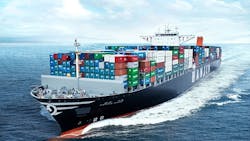Nike, Polo Marooned Suppliers Race to Meet Thanksgiving Rush
Suppliers to companies such as Nike Inc. and Hugo Boss AG are scrambling to ensure their T-shirts and sneakers reach buyers in time for the year-end holiday season after the collapse of Hanjin Shipping Co. left an estimated $14 billion worth of goods adrift.
Esquel Group, a Hong Kong-based manufacturer for fashion brands including Nike, Hugo Boss and Ralph Lauren, is hiring truckers to move four stranded containers of raw materials to its factories near Ho Chi Minh City as soon as they can be retrieved from ports in China. Liaoning Shidai Wanheng Co., a Chinese fabrics importer and a supplier to Marks & Spencer Group Plc, has made alternative arrangements for shipments that were scheduled with Hanjin.
“Our production lines are waiting,” said Kent Teh, who runs Esquel’s Vietnam business. “We potentially have to take airfreight to deliver the garment items to clients in the U.S. and U.K.”
Apparel, handbags, televisions and microwave ovens are among goods stranded at sea after Korea’s largest shipping company filed for bankruptcy protection last week, setting off a series of events that roiled the global supply chain. A U.S. Court on Tuesday provided a temporary reprieve, which may help vessels call on ports such as Los Angeles without the fear of getting impounded. Any major bottlenecks ahead of Thanksgiving and Christmas could put a dent in the two-month shopping season, which netted some $626 billion of sales last year in the U.S.
Supporting Hanjin’s Chapter 15 U.S. Bankruptcy Court petition, Samsung Electronics Co. said in a court filing that about $38 million of its goods were on board two Hanjin vessels off Long Beach, California. Its visual display business division has parts and finished goods in 304 containers meant for its factory in Mexico, while its home appliance business unit has refrigerators, washing machines, dishwashers and microwaves in 312 containers.
If the cargo isn’t unloaded immediately, the company will be forced to transport alternative parts by air to help meet contractual obligations at “great costs,” Samsung said. For example, it would have to charter at least 16 planes at a cost of about $8.8 million to move 1,469 tons of goods, it said.
“All these costs and delays will be a loss not only to Samsung, but also to major retailers in the U.S. and, ultimately, to U.S. consumers,” Samsung said in the filing.
Handbag maker Michael Kors Holdings Ltd. said it had concerns about Hanjin for some time.
“We did have a limited number of containers hung up on those ships; there’s going to be some pricing pressure at this point,” Chief Executive Officer John Idol said Wednesday at a conference in New York. “We don’t expect significant long-term impact.”
At the same conference, Emanuel Chirico, CEO of Calvin Klein and Tommy Hilfiger owner PVH Corp., said Hanjin handles a small portion of the company’s business, and “it really hasn’t impacted us at all.”
As parent Hanjin Group and the South Korean government consider steps to salvage the shipping company, retailers in the U.S. last week called for measures to help temper losses. About 86 of Hanjin’s ships were stuck at 50 ports in 26 countries, with vessels turned away out of concern the company has no cash to pay various docking fees and handling charges. A favorable ruling from a U.S. bankruptcy court this week protected Hanjin’s assets in the U.S. against creditors, while the shipping line proceeds with its reorganization in South Korea.
Using Planes
With cargo stuck on ships, Esquel’s Teh estimates a production delay of about a week and a doubling of transport costs. Besides truckers, a faster ship will be hired to transport the items from Hong Kong, he said. He also plans to fly finished products out of his factories to meet deadlines.
Some manufacturers are switching to other shippers, said Hoang Ngoc Anh, deputy secretary general of Vietnam Textile and Apparel Association.
Over in China, Shanghai Lansheng Corp., which exports shoes, office supplies and musical instruments, said it is asking each of its business divisions to check if they have any stock stuck at sea.
Korea’s Image
Nike and Ralph Lauren declined to comment, while Hugo Boss didn’t immediately respond to an e-mailed request for comments.
“Retailers’ main concern is that there’s millions of dollars worth of merchandise that needs to be on store shelves that could be impacted by this,” Jonathan Gold, vice president for supply chain and customs policy at the National Retail Federation trade group, said last week.
Another group, the Retail Industry Leaders Association, urged U.S. Secretary of Commerce Penny Pritzker and Federal Maritime Commission Chairman Mario Cordero to intervene.
In last-ditch efforts to pull the shipping company back from the brink, Hanjin Group said Tuesday it will provide 100 billion won ($92 million), including 40 billion won from Chairman Cho Yang Ho, to help contain disruptions in the supply chain. Separately, South Korea’s ruling Saenuri Party asked the government to offer about 100 billion won of low-interest loans if the group provides collateral.
Hanjin Shipping filed for bankruptcy protection last week after its proposal for restructuring failed to pass muster with lenders led by state-owned Korea Development Bank.
“The disruptions have dented South Korea’s image,” said Lee Sang Jae, an economist at Eugene Investment & Securities Co. in Seoul. “If this prolongs, it will only cause more concern to companies.”
By Nguyen Dieu Tu Uyen, Kyunghee Park and Mai Ngoc Chau
About the Author
Bloomberg
Licensed content from Bloomberg, copyright 2016.
